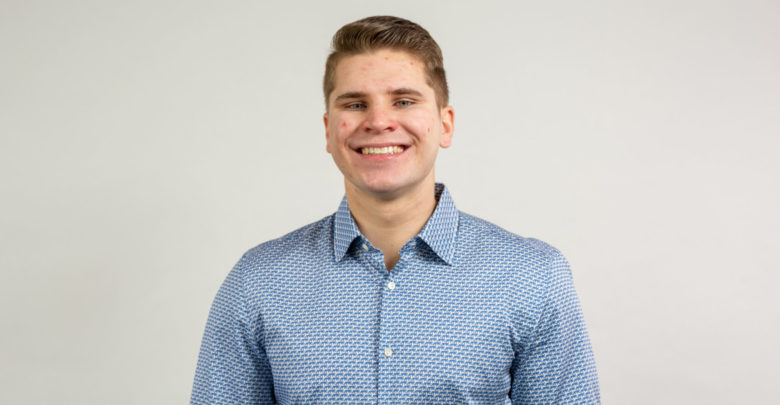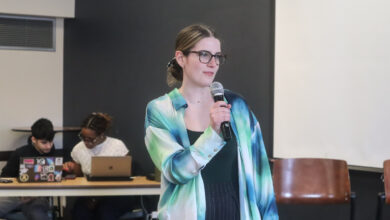 Lochlann Kerr
Lochlann KerrEach year, The Gateway publishes an evaluation of the Students’ Union Executive and the Board of Governors representative. It’s impossible to discuss every aspect of their tenures, so these reports are largely based on the major components of the platform each executive campaigned on, and the most significant responsibilities of their respective positions.
And if you’re short for time, check out our TLDR for a bite-sized breakdown.
Alexander Dorscheid: D
The Board of Governors undergraduate representative is responsible for representing the voice of the student body to the Board of Governors (BoG), and the BoG to the University of Alberta Students’ Union (UASU).
As BoG rep, Alexander Dorscheid advocated against tuition increases and advocated for increased accessibility to mental health supports.
Advocating for accessibility on campus
Dorscheid’s platform was very short, and only featured four goals he hoped to achieve during his term. Two of these concerned accessibility on campus: installing a hybrid-learning solution following the COVID-19 pandemic, and creating ease of access to mental health supports on campus.
Hybrid-learning was a major theme during Dorscheid’s campaign, and the idea he explored the most in his platform.
In our interview, Dorscheid said the university recognized hybrid-learning as a viable option to offer students. However, he said this is something that will be implemented in the future, not during his term.
When it came to advocating for easy access to mental health supports, Dorscheid wanted to push the university to emphasize accessibility. In our interview, Dorscheid said that when he came into his role, he wasn’t entirely sure how he was going to achieve this.
“This was not something I was entirely able to do,” he said.
Dorscheid also spoke on mental health supports in our interview. “There’s definitely been a focus by the university put more resources towards [mental health supports] now,” Dorscheid said.
However, tangibly, students still feel like mental health supports on campus are lacking. That being said, mental health has been a major concern on universities in recent years. Anything that has been done can’t necessarily be attributed to Dorscheid or his advocacy, despite what he thinks.
Increasing BoG rep transparency falls to the wayside
In our interview, I asked Dorscheid if he thought any goals he included in his platform wouldn’t be achieved during his term. He said that upon further realization, his ideas about increasing transparency for his role wouldn’t be “the best thing.”
Advocating for more transparency was a focal point of Dorscheid’s campaign. His plan was to make an Instagram account where he would post updates on the work he was doing. Initially, Dorscheid thought this was a great idea, he said.
But, he realized that students barely check the UASU’s accounts, so why would they go through the effort of checking his?
“Why would people follow another account? I think a lot of the major things that students do need to see do end up getting posts on those accounts anyways,” he said.
He’s not wrong. Social media accounts are good at promoting posts and information, but only to the people that follow them. Students are already apathetic when it comes to student politics. They wouldn’t go through the trouble of finding yet another account to follow.
That being said, Dorscheid promised to increase transparency of the BoG, whose issues largely go unseen by the majority of campus. The issues discussed in BoG have huge impacts on the lives of students, like tuition increases. While Dorscheid is right that the UASU will post about the most important advocacy updates, this doesn’t necessarily include things talked about in BoG.
He is meant to represent students to the BoG. I want to hear from him, not just the UASU. After he realized that an Instagram account wouldn’t work, it seems Dorscheid just gave up on his goal, and didn’t look for any other alternatives. Previous BoG reps have made advocacy updates on social media — it might be performative, but that’s definitely better than radio-silence.
Students not adequately represented in tuition advocacy
When I asked Dorscheid how he fought against tuition increases this year, he said that he “brought it up to the board.”
“We’re having those conversations at the board table with governors, and showing administration ‘okay, what you’re doing is not okay,'” he said.
Continuing, he said that this was reflected in the consultation process, which involved students more than it had in the past. However, many students feel like the consultation process was inadequate. Despite Dorscheid communicating with BoG that tuition increases weren’t okay, they happened anyway.
I asked Dorscheid how he advocated for international students, who are facing a proposed 6 per cent tuition increase. He didn’t elaborate on what advocacy he did for specific groups, but did say, “it’s kind of been more students as a whole I’d say.”
In the June 17 BoG meeting, Dorscheid, UASU President Abner Monteiro, and Graduate Students’ Association President Anas Fassih all declared a conflict of interest (COI) when it came to discussions about tuition increases. I found this odd, since declaring a COI meant that you recuse your right to vote. Essentially, Dorscheid would have removed himself from advocating against tuition increases. Thankfully, this COI was considered manageable by the BoG, and they were allowed to vote anyway.
In our interview, Dorscheid said that declaring a COI was mandatory, and reflected in bylaw. This bylaw, however, was actually amended in the May 13 meeting, and during tuition discussions, this requirement was removed.
He also said he has a fiduciary responsibility to the BoG, not necessarily his constituents.
“So, even if there’s a situation where it might be against our constituents, we still have a fiduciary responsibility to act within the best interests of the university. So because of that, we are clearly at a conflict of interest because it is never optimal for students to face tuition increases,” he said.
But, this contradicts his platform, where he said the opposite.
“I have a fiduciary responsibility to students to stand up against tuition increases,” his platform said.
I find it alarming that Dorscheid changed his tune so quickly. As the undergraduate representative, he should be acting in the best interest of those who voted for him, not the university. The fact that he claims to have more of a responsibility to the university than to students is, frankly, upsetting.
It’s true that governors have a responsibility to act in the best interest of the university. But, by nature, the BoG rep is meant to convey the needs of students, who have equal importance to the university.
If not in the interest of students, what is the point of Dorscheid being there? Students need to know that those in charge of advocating on their behalf are doing so wholeheartedly.
Based on his comments, Dorscheid seems to care more about the university than the students who voted for him in the first place. How can we trust him to advocate for us, if he almost removes himself from voting and claims fiduciary responsibility to the university, instead of students?
TLDR: Dorscheid campaigned with a very small platform, and was unable to achieve many of the goals he set out to. He advocated against tuition increases, but also claimed a COI during discussions. He wanted to increase board transparency, but ultimately thought students would hear about his advocacy through the UASU’s accounts. He set out to advocate for hybrid-learning options and easier access to mental health supports on campus, but neither came to be as a result of his advocacy.
A-range: This person has fulfilled the promises they campaigned on and more, has created tangible change during their tenure, and has shown a commitment to improving the lives of students. Their GPA is top tier.
B-range: This person has done their job consistently well, but has not made any remarkable changes, or has fallen short on important goals they set out in their platforms. They’re doing fine, but it’s nothing to phone home about.
C-range: This person has done their job sufficiently, but has failed to make significant progress in the areas most relevant to their portfolio, or has essentially abandoned a major part of their platform. They’re still passing with a safe buffer though, and Cs get degrees!
D-range: This person has done a very lacklustre job, and has not sufficiently fulfilled their campaign promises or the responsibilities of their position.
F-range: This person has not done their job, has not represented students, and has not fulfilled their campaign promises whatsoever.




